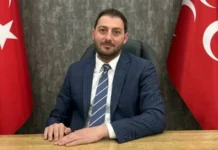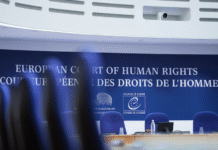
In Turkey’s largest freedom of press case where prominent journalists and authors were tried on dubious charges, the court ruled to keep them in jail despite they have already been behind bars for more than five hundred days. The same court ruled for the release of Hüseyin Belli, Onur Kutlu and İsmail Küçük who were working at the advertisement section of Zaman daily. All three were accused of receiving severance payments from the company they had worked
The second hearing was held in the case of Zaman journalists on Friday in İstanbul’s notorious Silivri Prison compound where 31 journalists were brought up to the court to face fabricated charges of terrorism and coup plotting. Of them, 21 journalists and media workers were already jailed in pre-trial detention. At the conclusion of the hearings on Friday, the court decided to release only three media workers. The next hearing will be held five months later, on April 5, 2018, which is a punishment in itself.
Public prosecutor is seeking three consecutive life sentences for journalists and executives of Zaman Daily, one time best-selling newspaper of Turkey, on charges of attempting to overthrow the constitutional order, the Turkish Parliament and the Turkish government. As if life time sentencing was not enough, the prosecutor also asks an additional jail sentence of up to 15 years on charges of being members of a terror organization called Fetö, a pejorative acronym that Turkey’s political Islamist government has used to smear the civic Gülen movement.
The Zaman daily was first unlawfully seized by the Turkish government on March 4, 2016 and then closed down by government decree in the aftermath of a controversial coup attempt on July 15, 2016.
There is a total of 31 defendants in the indictment, 21 of whom were jailed. Mümtaz’er Türköne, Şahin Alpay, Ali Bulaç, Ahmet Metin Sekizkardeş, Ahmet Turan Alkan, Alaattin Güner, Cuma Kaya, Faruk Akkan, Hakan Taşdelen, Hüseyin Belli, Hüseyin Turan, İbrahim Karayeğen, İsmail Küçük, Mehmet Özdemir, Murat Avcıoğlu, Mustafa Ünal, Onur Kutlu, Sedat Yetişkin, Şeref Yılmaz, Yüksel Durgut and Zafer Özsoy have been in pre-trial detention for 16 months
“There is no single evidence against me in the indictment,” said Mehmet Özdemir, Zaman’s editor who has been a journalist for 20 years. Özdemir, 42 year-old journalist, told the panel that he submitted a petition last June in order to learn about the evidence against him but he did not receive any reply so far from the court despite he appeared for the second hearing to defend himself against the charges.
“I feel as if I am non-visible before the court,” Özdemir told the court. He suggested there would be no difference if his name was omitted from the indictment and anyone in the street was included instead.
Mümtaz’er Türköne (61), a professor of political science and columnist is another defendant in the case. He questioned the indictment and criticized the presiding judge for failing to acquaint defendants with the lack of evidence against them.
Türköne recalled the precedent set up by the Supreme Court of Appeals in setting the benchmarks for membership to a terror group and involvement in a terrorism, saying that his op-ed articles cited in the indictment as evidence did not amount to a crime given current laws and regulations in Turkey.
“I can personally present my columns included in indictment as evidence in favour of me rather than evidence against me,” said Professor Türköne and asked the panel whether they [defendants] were tried for reporting “December 17-25 graft probe,” the biggest corruption investigations that were made public in December 2013 and that incriminated cabinet ministers and President Erdoğan’s family members.
Ahmet Turan Alkan (64), academic and prominent columnist, said “Prying eyes of the Big Brother is surrounding this room,” suggesting that the intense pressure of President Erdoğan on judiciary, and added “There is no difference between being a suspect and a judge in this case.”
“500 days that were stolen with force from a man’s life can never be trivialized. You are much better aware of this than me, everyone is aware. This case has not been launched as a criminal case as described in the law. This case is an act of vendetta and a political vindication. We testify as defendants due to this grudge motive and euphoria,” he explained. He then asked, “Is it so easy to steal 500 days from the life of an ordinary person with such a weak and unacceptable accusation?” said Alkan.
Şahin Alpay, a prominent columnist and academic, started his testimony by informing about his deteriorating health condition. “I have many chronic diseases and my health is getting worse, I was told that I should have undergone angiography without delay. I had a hearing loss of 30-35 percent in my ears before the prison now it is measured to be 50 percent. My detention has become a punishment for me,” he testified.
Alpay also expressed his disappointment that despite the fact that he was known for his opposition against violence and terror, he was tried over being a member of a terror organization and coup charges.
“There are 7 columns written by me in indictment but prosecutor only mentioned them by titles,” said Alpay claiming the indictment does not deal with the content of his writings at all. Alpay, 74 year-old man, asked the court to allow him to spend his remaining years with his wife, children and grandchildren.
İbrahim Karayeğen, a night-shift editor at Zaman newspaper, who had been subjected to torture in prison for months said his name was only on the list of suspects and no accusation against him appeared in the indictment. “I don’t know what my charges are, I can only guess. It seems to me that journalism is being tried here and journalism is not a crime,” emphasized Karayeğen.
Mustafa Ünal who was the Ankara representative of Zaman daily said he was behind bars for 500 days and he did not know the reason for it. “I have written thousands of columns. There is no single word praising coup in any one of them. It is the duty of the prosecution to prove I am a member of a terror organization,” said Ünal.
Lawyer and columnist Orhan Kemal Cengiz (49) told “I did not figure out until now why I am here. There is no column of mine cited in the indictment despite the fact that I am accused of committing a crime as a columnist at Zaman”
Cengiz recalled he was detained last year at the airport in İstanbul. He was later informed that the reason of detention was simply because he represented Zaman daily at the European Court of Human Rights (ECtHR) as an attorney.
Another suspect Lale Kemal (60), Turkey’s top defense reporter and columnist, claimed the trial became an example of collective punishment, disregarding the presumption of innocence.
Nuriye Ural (60), prominent journalist rejected accusations of terror and said “She was the first journalist who interviewed Fethullah Gülen,” a US-based Turkish-Muslim scholar and outspoken critic of President Erdoğan, “while she was working at Sabah Daily,” now a propaganda newspaper owned by the Erdoğan family.
İhsan Dağı, an academic and columnist told the panel he quitted writing for Zaman three years ago and asked how he could be associated with incidents occurred after he left.
There are also some media workers among defendants.
Alaattin Güner, general manager of Cihan Medya Dağıtım, a newspaper distribution company that was seized and shut down by the government last year, repeated his testimony of the first hearing that there was no accusation against him in the indictment. “I worked at a distribution company that has nothing to do with the content of the newspapers,” said 45 year-old Güner.
Ahmet Metin Sekizkardeş (50) rejected that he was the chairman of Cihan Medya Dağıtım. “Three consecutive life sentences are claimed about me but the indictment fails to prove my membership of any terror organization,” said Sekizkardeş.
Zafer Özsoy (44), is accused of buying a satellite truck from his former employer Cihan News Agency which was seized and shut down by the government last year. Özsoy told in the hearing that there was no such a crime defined in the Turkish Penal Code that barred from anybody buying a satellite truck for a business.
The court ruled for the release of Hüseyin Belli, İsmail Küçük and Onur Kutlu who were working at the advertisement section of Zaman daily. All three were accused of receiving severance payments from the company they had worked
Mümtaz’er Türköne, Şahin Alpay, Ali Bulaç, Ahmet Metin Sekizkardeş, Ahmet Turan Alkan, Alaattin Güner, Cuma Kaya, Faruk Akkan, Hakan Taşdelen, Hüseyin Belli, Hüseyin Turan, İbrahim Karayeğen, İsmail Küçük, Mehmet Özdemir, Murat Avcıoğlu, Mustafa Ünal, Onur Kutlu, Sedat Yetişkin, Şeref Yılmaz, Yüksel Durgut and Zafer Özsoy have been in pre-trial detention for 16 months as the judges kept rejecting challenges to pre-trial detentions despite there was no reason to keep them in jail pending charges other than Belli, Kutlu and Küçük.
Ahmet İrem, Ali Hüseyinçelebi, Süleyman Sargın, Osman Nuri Arslan, Osman Nuri Öztürk, Lalezer Sarıibrahimoğlu, Nuriye Ural and Orhan Kemal Cengiz are also mentioned as suspects in the indictment and they are being tried without a detention. Professor İhsan Duran Dağı, who used to work as a columnist for Zaman, is cited as a fugitive in the indictment.
The formal charges include “membership in a terrorist organization” and “attempting to dissolve the government of the Turkish Republic, or partially or entirely preventing its performance by the use of force or threat.”
İstanbul Public Prosecutor İsmet Bozkurt, who wrote the 64-page indictment, has been seeking three consecutive life sentences for the Zaman staff on charges of attempting to overthrow the constitutional order, the Turkish Parliament and the Turkish government and a jail sentence from 7,5 years up to 15 years on charges of being members of an armed terror organization.
The only evidence cited in the indictment as a proof of ‘terrorism and coup plotting charges’ are the published op-ed pieces for some and being an administrator in the newspaper for others. The articles that commented on the major graft investigations that were made public in December 17-25, 2013 and that incriminated Erdoğan, his family members and his political and business associates were included in the indictment as criminal evidence and somehow linked to July 15, 2016 coup attempt. In a bizarre conclusion, the prosecutor said that the articles themselves did not carry any element of crime yet when considered collectively they must be construed as aiming to overthrowing the government.
For all journalists, the indictment claimed they exceeded the limits of press freedom and freedom of expression, violated rights of the government officials and state institutions, served for the purposes of a terrorist organization, threatened the national security, made statements that may disrupt social harmony and peace and did not shy away from calling for a coup against the government.
As of December 7, 2017, Stockholm Center for Freedom (SCF), a Stockholm-based monitoring and rights advocacy group, has confirmed that 256 journalists and media workers are behind bars in Turkey, a new world record by any measure. Moreover, sweeping detention warrants have been issued for 135 journalists who are forced to live in exile abroad or remain at large in Turkey.
Turkey’s Justice Ministry announced on July 13 that 50,510 people have been arrested and 169,013 have been the subject of legal proceedings on coup charges since the failed coup.

Ahmet Turan Alkan (64) is a popular columnist and author who had been regular contributor to Zaman daily for years. The evidence against him is seven published op-ed pieces that mentioned about the 2013 corruption investigations into government officials. The articles were published from Dec-21, 2013 to March 29, 2014.
He has been facing unwarranted restrictions in the prison and his rights were violated. Turkish authorities banned books from him for nine months before they finally agreed to give him the books he wanted. That was the ultimate punishment for an author who loved writing and reading books throughout his lifetime career. His family recounted how Alkan felt when he faced this prohibition:
“When they banned bringing books from outside, I felt like they cut off my oxygen supply. To prevent a prisoner, especially someone like me whose entire life has been spent among books, from reading the books he wants is a huge pressure. Prohibiting to bring books from outside does not mean anything other than to turn my psychological balance upside down and drag me into a psychological breakdown. Even so, I keep hoping that I will be able to come together with books again and do not yet seek a support from a psychiatrist. When you want anti-depression drug from a psychiatrist, that wish gets granted but no books provided.”
His rights to send letters were also denied and access to his family was limited to once a week. His weight has dropped from 83 kilos to 69 kilos. Alkan suffers vertigo and chronic blood pressure. According to an interview given to P24 news portal by his son, Alkan has written four books in prison so far: A novel titled “Sağ Yanım” (My Right Side), an auto biography work titled “Bir Hobi Budalasının Biyografisi” (A Biography of A Hobbyists Fool), a children book that talks about how humans made the planet uninhabitable, and the last one is about a love story that started from a train station in rural area.

Şahin Alpay (74), a well-respected professor and regular contributor for Zaman daily, was detained on July 27, 2016 and subsequently arrested on July 31, 2016 and sent to Silivri Prison.
Alpay’s lawyers have many times objected to his imprisonment and said their client was not physically fit to stay in prison; however, the court turned down their requests for the release of Alpay, saying that he is receiving the necessary treatment in prison. He suffers from heart troubles, blood pressure, prostate, apnea and other illnesses.
Alpay’s lawyers applied to the European Court of Human Rights (ECtHR) on Feb. 20, 2017 demanding his release on the grounds that court decisions both for the imprisonment of Alpay and for the continuation of his incarceration were unfair and because his health problems pose a risk to his life in prison. He has written three biographies and is currently working on a novel.
Ahmet Metin Sekizkardeş (50), a manager in Cihan Medya Distribution company, is facing three aggravated life sentences on coup plotting charges and upto 15 years on terrorism charges. The only criminal evidence in the indictment against him is cited in one sentence: Being an administrator in Cihan Medya Distribution.
Alaattin Güner (45), a former manager in Cihan News Agency, is facing same charges. Then evidence against him is the fact that he worked in the news agency’s managerial position.

Ali Bulaç (66), a veteran columnist and writer, has been under arrest since July 31, 2016. According to a report prepared by the delegation from the main opposition Republican People’s Party (CHP) that paid a visit to him in Silivri Prison, he is not able to access writing materials or books.
“Let them give me a meal only once a day. It doesn’t matter of they leave me to starve, but they should not keep me without books. I am 66 years old. I want to write a new book, but I can’t. This affects me more than hunger,” Bulaç said. “I have health problems. I have diabetes. [But] they give me only generic pills, not the prescribed ones,” he added.
A columnist and op-ed contributor for the Zaman newspaper, Bulaç was detained on July 27, 2016 over his ties to the Gülen movement. He was arrested four days later.
The criminal evidence against him is his eight published articles that are critical of the government. His article stating that Syrian government is accusing Turkey of aiding armed rebel groups that wage a war and this complaint must not be taken lightly was considered as targeting Turkey’s National Intelligence Organization (MİT). The article was published on January 18, 2014. In another article, Bulaç was accused of writing in similar lines with US-based Muslim scholar Fethullah Gülen when in fact the columnist simply quoted Gülen’s speech that was posted on the cleric’s own web site.
Cuma Kaya (42), a former manager in Cihan News Agency, is being accused of coup and terrorism charges based on the fact that he worked in the news agency as an administrator. His partnership in a company called Fia Prodüksiyon Radyo ve Televizyon Reklam Organizasyon İletişim San. Ve Tic. Ltd. Şti, a production and advertising firm, was listed as if he was engaging in a criminal activity. Kaya’s selling his shares to Murat Avcıoğlu on May 2016 was also mentioned in the indictment.

Faruk Akkan (46), a long-time bureau chief in Moscow for daily Zaman who later became the general manager of Cihan News Agency, replacing the journalist Abdülhamit Bilici who left this position on November 5, 2015. Then only evidence against him is the fact that he run the news agency which was seized by the government in March 2016 and shut down in July 2016.
Hakan Taşdelen (38), owner of the Fia Prodüksiyon Radyo ve Televizyon Reklam Organizasyon İletişim San. Ve Tic. Ltd. Şti who brought former managers of Cihan News Agency, Zafer Özsoy ve Yüksel Durgut and Cuma Kaya, as partners to the firm.
Hüseyin Belli (43), a manager at Zaman daily, is accused of coup and terrorism charges based on the fact that he served in a managerial position in critical daily.
Hüseyin Turan (50), also a manager at Zaman daily, faces same charges because he worked as a manager in the newspaper.

İbrahim Karayeğen (52), a former editor on the late edition for Zaman newspaper. There is no accusation listed against him personally. He was not listed among administrators either. The prosecutor simply added his name on the last page of the indictment along with authors whom he claimed threatened the national security of Turkey. Yet, Karayeğen had never written any column for the newspaper.
Karayeğen was detained the day after the failed coup attempt as he was about to leave for a vacation. His family and friends searched for him for weeks through the authorities. It later came to light that Karayeğen was among the first journalists who were imprisoned on the night of the coup attempt. He was kept in 30 days in police detention before he was formally arrested and sent to the prison. He told his family that he was subjected to torture during the police custody and had difficulty in walking.
His 21-year-old daughter Zeliha Esra Karayeğen was also arrested in August 2017 for having an account in the government-shuttered Bank Asya and for downloading mobile phone messaging app ByLock, believed by authorities to be a communication tool among the alleged followers of the Gülen movement. The bank account was opened by her father for her tuition when she was 18.
Although Zeliha Esra Karayeğen and her lawyer demanded the opportunity to present a defense against the accusations, the judge said it was “not necessary” and ruled for her arrest.
İhsan Duran Dağı (53), a professor of international relations and columnist for Zaman daily, was accused of same charges over three published articles in January and February 2014.
İsmail Küçük (42), his position in Zaman daily at managerial position was considered enough by the prosecutor to charge him in coup plotting and terrorism charges.

Lalezar Sarıibrahimoğlu (60), a veteran journalist and specialist in defense and military affairs, faces three consecutive lifetimes sentencing in the indictment but the prosecutor did not mention which of her writings constituted a crime. Journalist Sarıibrahimoğlu was arrested in July 31, 2016 and released in October 2016 pending trial.
Mehmet Özdemir (42) is facing the same charges on the account that he worked as one of the editors in Zaman newspaper.
Murat Avcıoğlu (43) has partnership in the Fia Prodüksiyon Radyo ve Televizyon Reklam Organizasyon İletişim San. Ve Tic. Ltd. Şti. This was considered enough evidence to indict him on terrorism and coup charges.

Mustafa Ünal (50), long-time Ankara bureau chief for Zaman daily and well-known figure in Turkish capital, facing three aggravated lifetime punishments if he gets convicted on coup plotting charges. The prosecutor also asks additional 15 years jail time on terrorism charges.
The only evidence cited against him is ten of his published articles in Zaman daily from December 2013 to March 2014. The prosecutor claimed that the journalist’s interview with the main opposition Republican Peoples’ Party (CHP) that was published on December 25, 2015, was praising a terrorist organization.
Ünal has been experiencing health problems in Silivri Prison, where he was incarcerated since July 31, 2016. He suffered from shingles in January 2017 but was taken to a hospital only on the sixth day after contracting the disease. The medication prescribed to Ünal by the doctor was not given to him for a while.

Mümtazer Türköne (61), a professor of political science and former columnist at Zaman daily, stands accused of terrorism and coup charges because of nine of his critical writings that were published from December 2013 through March 2015.
Another indictment was also prepared by an İstanbul prosecutor seeks three years sentence for Mümtaz’er Türköne on charges of “threatening Turkish President Recep Tayyip Erdoğan” in a column he wrote on February 2016. An İstanbul court handed down a prison sentence of four years, two months to Türköne on charges that he threatened Turkey’s autocratic President Recep Tayyip Erdoğan in one of his articles.The decision for conviction was made by the Bakırköy 2nd High Criminal Court. In his defense, Türköne denied having threatened Erdoğan and demanded his acquittal.

Nuriye Ural’s (60) crime is her writings at Zaman daily. Like Lalezar Sarıibrahimoğlu’s case, the prosecutor also did not explain which published articles violated what crimes. Yet she faces same sentencing in case she gets convicted. Ural was arrested in July 31, 2016 and released in October 2016 pending trial.
Onur Kutlu (39), a former manager at Zaman daily, is accused of same charges based on his administrative position at the critical newspaper.
Sedat Yetişkin (69), a manager, targeted in the indictment because of his partnership in media outlets Cihan News Agency, Samanyolu TV Network and his role as administrator in Zaman daily.
Şeref Yılmaz (47) stands accused of same charges because of his administrative position at Zaman newspaper.
Yüksel Durgut (45) is another manager who was indicted. His partnership in the Fia Prodüksiyon Radyo ve Televizyon Reklam Organizasyon İletişim San. Ve Tic. Ltd. Şti., was considered enough evidence to indict him on terrorism and coup charges
Zafer Özsoy (43), a manager in the Fia Prodüksiyon Radyo ve Televizyon Reklam Organizasyon İletişim San. Ve Tic. Ltd. Şti was considered to be a criminal offense that warrants three aggravated lifetime sentencing if he gets convicted.
Ahmet İrem’s (44) crime was his administrative role in Zaman newspaper.
Ali Hüseyin Çelebi’s (48) role in the disbursement of profit shares to company employees before the government’s unlawful takeover the media outlet was considered to be a crime. Like all the others in the case, he was charged on coup and anti-terrorism laws.
Süleyman Sargın, (43) a manager in Zaman newspaper and its parent company Feza Gazetecilik, was listed as offenses that warrant three aggravated lifetimes sentencing according to the indictment.

Orhan Kemal Cengiz, (49) Turkish lawyer, journalist and human rights activist, is facing three consecutive life sentences on coup charges along with others in the case. Although he was not a columnist for Zaman, he was accused of writing articles for the daily.
Osman Nuri Arslan (34) is accused of same charges because of his employment at Zaman daily’s managerial position.
Osman Nuri Öztürk (56) faces the same accusations over his role as a manager in the daily.














